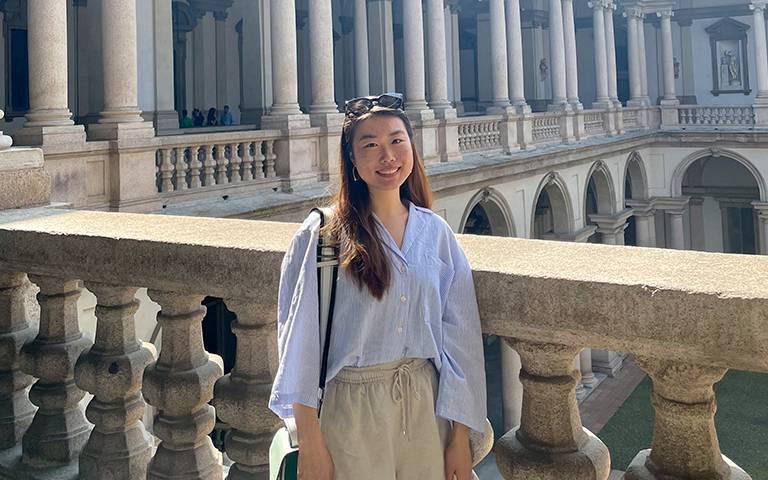Vivian Kong, MSc Global Migration
Meet Vivian, a student on our MSc Global Migration programme.

17 January 2024
She tells us about how her passion for understanding the intricacies of migration and diasporic experiences led to her study with us.
Why were you interested in studying an MSc in Global Migration?
“I developed an interest in studying migration during my undergraduate years majoring in international relations.
“I had focused on environmental studies and Spanish and Latin American culture.
“It became clear throughout my classes that human migration was at the core of many debates on labour, politics, and identity.
“The intricacies of migration and diasporic experiences intrigued me, especially as I learned more about my own family’s migration stories, and pushed me toward migration studies.”
And why did you to choose to study at UCL?
“As I began searching for programmes to apply to, I knew I wanted to maintain an interdisciplinary perspective and study with diverse faculty that aligned with my values.
“I found these traits in UCL’s Geography Department.
“The faculty on the Global Migration course encourage multidisciplinary thinking and the application of concepts to both classroom projects and the real world, highlighting the Department’s commitment to research and public engagement.”
What were the most interesting or engaging things you learned on the course?
“I appreciated the holistic approach to teaching contemporary migration, making sure that a foundation was built while also offering the chance to focus on case studies and develop one’s own interests.
“Each elective module I took offered new selections of readings, films, and other material that expanded my understanding of how migration manifests in both mundane and extraordinary settings.
“Learning from and speaking with Tatiana Thieme, Tom Western, Luke de Noronha, and other brilliant faculty have taught me how to orient my interests in topics I am passionate about.
“I’ve learned how movements across borders create ripples in border regimes, how people command action on the streets to form social movements, and how imagination plays a role in belonging to a national border.
“I’ve enjoyed studying everything from the politics to the poetics of migration.”
Can you tell us about any particularly memorable experiences from your time as a Master's student with us?
“The process of forming and writing the dissertation was the most memorable experience for me.
“It was the longest piece I’ve ever written, and it was my first opportunity to conduct fieldwork.
“I was able to build from the many moments where I felt inspired by my classmates and lecturers, and it was heartwarming to listen to peers on presentation day.
“Seeing my dissertation topic come to life in written form was like a full-circle moment.
“I was able to travel back to Washington D.C., where I completed my undergraduate degree and first become interested in studying migration, and (re)connected with old and new academic and activist networks.”
What do you hope to do in the future?
“I hope to work at the nexus of migration policy, community engagement, and storytelling.
“Facilitating equitable communication and collaboration between stakeholders is key to navigating contemporary migration issues, and I hope to work in policy spaces with migrant and diasporic communities.
“I am also passionate about the art of storytelling in relation to migration experiences.
“Currently, I am working on a multimedia platform for diaspora to explore identity, subcultures, and community.
“After refining my research and professional interests more, I hope to continue my studies by pursuing a PhD or JD.”
Would you recommend studying Global Studies in the Department and why?
“I would definitely recommend studying Global Migration in the Geography Department because of the level of support you’ll receive from your fellow peers, the staff, and the faculty.
“Everyone is clearly passionate about what they are studying and are open to learn from one another.
“The academic rigour of the course is paired with this amazing network of support that will encourage you to think creatively and beyond disciplines, ensuring that the skills and topics you learn about won’t be forgotten after your time in the classroom.”
More Information
Interested in following in Vivian’s footsteps? Find out more about our MSc Global Migration course and see out other degrees in the Study section.
 Close
Close

